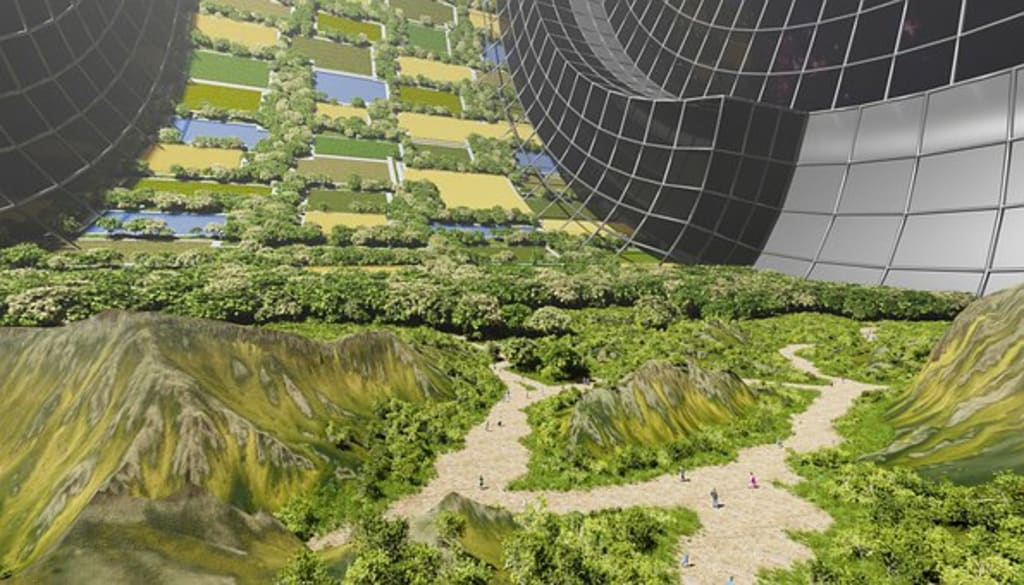
Space colonization is a theoretical or hypothetical human settlement in space, typically on another planet or moon, that would support human life and activities. The idea of space colonies has been explored in science fiction for many years, and it has also been discussed as a potential solution for future human colonization and exploration beyond Earth. While the concept of space colonies may seem far-fetched, many scientists and researchers believe that space colonization may be necessary for the long-term survival of the human species. This article explores the potential benefits, challenges, and technologies involved in establishing space colonies.
Benefits of Space Colonies
The potential benefits of space colonies are numerous and significant. Firstly, space colonization would allow for the expansion of human civilization beyond Earth, thus reducing the risk of catastrophic events such as asteroid impacts or supervolcanic eruptions that could threaten the survival of the human species. Secondly, space colonies could provide a new source of resources for humanity, including minerals, energy, and water. Thirdly, space colonies could help to advance scientific knowledge and technological innovation, leading to new discoveries and inventions that could benefit society as a whole. Finally, space colonies could provide new opportunities for human exploration and adventure, allowing us to discover new worlds and expand our understanding of the universe.
Challenges of Space Colonies
Despite the potential benefits of space colonies, there are also many challenges that would need to be overcome in order to establish and maintain a self-sustaining human settlement in space. Firstly, developing the necessary technology for life support systems, such as air filtration, water recycling, and food production, would be a major challenge. Secondly, finding ways to sustainably produce food and resources in space would also be a significant challenge, as the environment is vastly different from Earth. Thirdly, protecting colonists from the hazards of space radiation and low gravity environments would be critical to their health and well-being. Finally, the cost of establishing and maintaining space colonies would be extremely high, requiring significant investment and resources from governments and private organizations.
Technologies Involved in Space Colonies
Developing the necessary technologies for space colonization is a complex and ongoing process, with many advancements being made in recent years. One key area of focus is life support systems, which are critical to sustaining human life in space. These systems typically include air filtration and recycling systems, water recycling systems, and food production systems. For example, NASA has developed a system called the Environmental Control and Life Support System (ECLSS) that can recycle air and water to provide a sustainable source of these resources for astronauts.
Another key technology for space colonization is transportation systems, which would be necessary to transport people and resources to and from space colonies. The development of reusable rockets and spacecraft, such as SpaceX's Falcon 9 rocket and Dragon spacecraft, has made space transportation more cost-effective and efficient.
In addition to life support and transportation systems, other technologies that would be critical to space colonization include robotics, 3D printing, and advanced materials. These technologies would be used to build and maintain space colonies, as well as to support human exploration and scientific research in space.
Current Space Colonization Initiatives
While space colonization is still largely a theoretical concept, there are several ongoing initiatives aimed at establishing human settlements in space. One of the most notable initiatives is the Mars One project, which aims to establish a permanent human settlement on Mars by 2032. The project plans to use existing technology to transport people and supplies to Mars, and to develop sustainable life support systems and infrastructure on the planet.
Another notable initiative is the International Space Station (ISS), a joint project between NASA, Roscosmos, the European Space Agency, the Japan Aerospace Exploration Agency, and the Canadian Space Agency. The ISS is a habitable artificial satellite in low Earth orbit that has been continuously occupied since 200 The ISS serves as a research laboratory and testing ground for technologies and systems that would be necessary for space colonization.
Other initiatives aimed at space colonization include the Lunar Gateway project, which aims to establish a permanent human presence in lunar orbit, and private initiatives such as Elon Musk's SpaceX and Jeff Bezos' Blue Origin, which aim to make space travel more accessible and cost-effective.
Ethical Considerations
The idea of space colonization raises several ethical considerations, including questions of ownership, sovereignty, and environmental impact. For example, if humans were to establish a settlement on another planet, who would own the land and resources? Would it be the government or private organization that established the settlement, or would it be a collective ownership by all of humanity?
Another ethical consideration is the impact that space colonization could have on the environment of other planets or moons. If humans were to establish settlements on another planet, what impact would that have on the indigenous life and ecosystems? What measures would need to be taken to ensure that the environment is not irreversibly damaged or destroyed?
In addition to the potential benefits and ethical considerations, there are also practical challenges to consider when it comes to space colonization.
One of the biggest challenges is the cost. Space travel and colonization require enormous amounts of resources and funding. Even with private initiatives such as SpaceX and Blue Origin, the costs associated with space colonization are currently prohibitive for most organizations and governments.
Another challenge is technology. While significant advances have been made in space travel and exploration, the technology necessary for long-term human habitation on other planets is still in development. This includes advancements in life support systems, energy production, and food production, among other things.
There is also the issue of distance. Even with advanced technology, space colonization will require long periods of travel and isolation, which can have significant psychological and physical effects on humans. In addition, communication and supply chain logistics will be challenging due to the vast distances involved.
Despite these challenges, many experts believe that space colonization is not only possible but necessary for the long-term survival and advancement of humanity. This view is supported by the increasing recognition of the potential threats to Earth, such as climate change, pandemics, and nuclear war. The ability to establish self-sustaining colonies on other planets or moons would provide a backup plan in case of a catastrophic event on Earth.
Conclusion
In conclusion, space colonization is a complex and challenging concept with many potential benefits and ethical considerations. While the challenges associated with space colonization are significant, ongoing research and development of necessary technologies and systems may make space colonization a reality in the not-too-distant future. The potential for human exploration and adventure, the discovery of new resources and scientific knowledge, and the expansion of human civilization beyond Earth make space colonization a topic worthy of exploration and consideration.
About the Creator
Gokila
She is an astrophile, introvert,
loves to read books all day long,
addicts in healthy lifestyle
and having curiosity to know about new things.
Life Is As Beautiful As You Make It. Contentment Is The Key To Happiness. Peace Be Upon The Saviour.






Comments
There are no comments for this story
Be the first to respond and start the conversation.